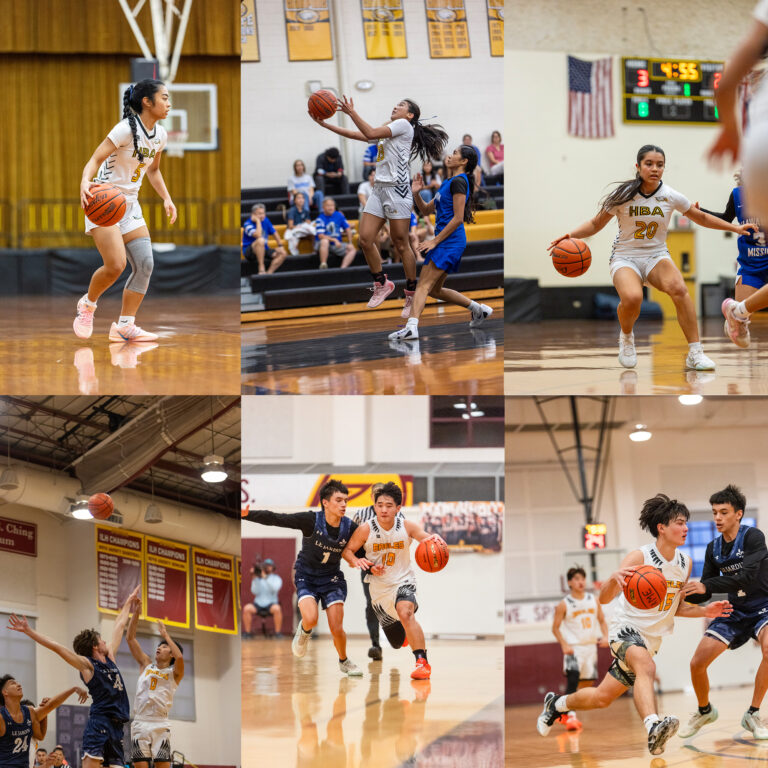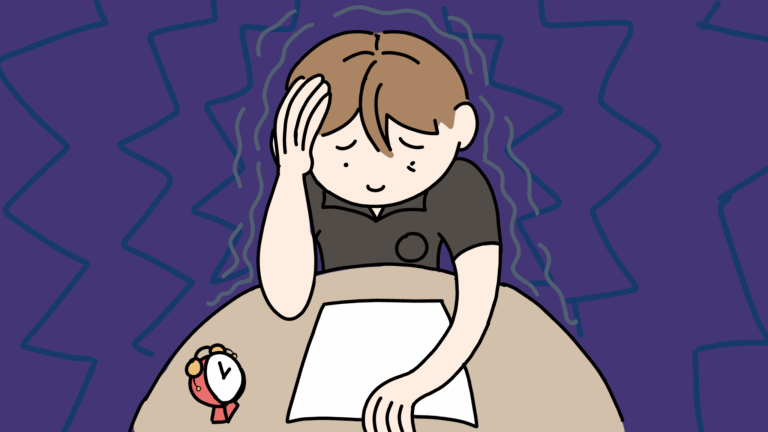In recent news, high profile athletes like Simone Biles and Naomi Osaka have taken a break from competing to prioritize their physical and mental health.
Although our HBA athletes do not participate in professional level sports, they still identify with similar pressures. With the additional stress of academic responsibilities, family expectations, college recruitment, and self-doubt, being a student athlete can feel like a lot.
For many student athletes, finding a balance between their athletic commitments and academic demands is a major stressor. Freshman Cole Sakai, who participates in the HBA basketball and volleyball teams and formerly Pac-5 paddling, worries about managing his time. He writes, “If I have a practice or game right after school, I worry that if I have a lot of homework I may not be able to finish it.” Likewise, varsity volleyball and basketball player Mark Fujimoto finds excelling in both of his priorities to be tricky. The senior writes, “Finding the right balance between practicing for my sports, hanging out with friends and studying was always a challenge for me. I would always choose to practice my sports or hang out with friends instead of giving myself a lot of time to study.”

Many athletes find that their personal identities are tied to excelling in their sports. Senior Emi Wada who plays for the girls’ varsity basketball team notices that it’s often hard to avoid being reduced to just someone who is good at something. She writes, “I believe that those people whom I encounter as acquaintances see me merely as the girl who plays basketball or someone who may sometimes excel at academics.” However, Wada has also found that as people get to know her better and as she forms deeper connections with them, they begin to “see her personality and characteristics beyond athletics and academics.”
Especially in sports, adolescents are faced with the overwhelming pressure to win or to be “the best”. Pac-5 soccer player Leila Leano, a freshman, writes, “There isn’t one specific moment, but at important events I often think about all of the time, money, and sleep that my parents have sacrificed. I sometimes feel that in order to make it all worth it, my team has to win, and I have to be at my best.” Although Leano acknowledges that this pressure can be helpful in motivating her to do well, she feels that the majority of the time this pressure prevents her from enjoying the game. Cross country runner Caley Chun agrees with Leano. “The pressure to win can be beneficial when understanding that I am representing my school and my team,” she says. “On the other hand, pressure often takes away the aspects of having fun and being excited.“
This month, Leano traveled to Florida to train with US youth soccer team. Leano felt both excited and nervous because the opportunity was very important to her. She writes, “There is definitely a lot of pressure on me to do well since my family and I put a lot of time and effort to get to this point. I am also representing the state of Hawaii, and I want to represent well.” While Leano was away, working hard at the National Training Camp, she missed out on four days of school. “There wasn’t really any free time for me to do my school work throughout the camp,” explains the soccer player. “Being away from school made it kind of difficult to keep up with assignments sometimes.” However, Leano is extremely grateful that her family has been helping her balance these responsibilities. She adds, “They have been very encouraging and supportive throughout this whole process, and it helps take off some of the pressure going into this camp.”

Young athletes in particular often feel the pressure to attain an ideal athlete’s physique. In ballet, for example, there are body types and feet types that are considered ideal for ballet dancers. Junior Cameron Pien, who has been dancing ballet for 13 years, says, “Ballet has a pretty strict idea of what your body should look like or what your physical characteristics should be.” The dancer added that she struggled with how her feet were not considered the ideal shape. “In dance, it’s really nice to have highly arched feet because when you can get on the box of your pointe shoe it looks really good.” Despite working really hard, Pien had to come to terms with not being able to change how her feet are formed. “I think a lot of people can relate to putting a lot of hard work into something and then not see it necessarily pay off,” she says. In her most desperate moments, Pien considered “taking a hammer” to her foot in hopes of remolding it to be more flexible. “I thought the pain would be worth it eventually because I could control it. I was born with these feet, and I can’t change that. But it’s hard when your outside environment is pressuring you to feel that way,” she says.
In spite of all of these pressures, these student athletes have found ways to cope. Wada is doing her best to not worry too much about the future. “The future is ultimately out of my hands,” she writes. “Whether I end up meeting or missing my family’s standards or making or being rejected from a college basketball team, I know that my family and friends and God will love me all the same and understand that if things don’t work out, it just wasn’t meant to be for me as part of God’s plan.” Junior Justin Sumiye, who has been bowling for eight years, makes sure to take time off from bowling bowling to prioritize his mental health. Sumiye writes, “Loads of school work combined with the pressure to do well can be a huge toll mentally, and it feels good to take a break.” Pien encourages other athletes to recognized when they are at the point of blaming or hating themselves for something they cannot control. “You have to realize that it’s not true and that you shouldn’t do that to yourself because it’s not you and it’s not your fault,” she says.
When asked about their opinions regarding Biles and Osaka’s decisions, student athletes at HBA all voiced support. Chun believes that these Olympic athletes made “the right decision” to prioritize their mental health. She adds, “In high school sports, I don’t think taking care of mental health is prioritized enough because I see so many amazing high school athletes stop playing their sport due to unhandled stress and pressure.” Sakai values the importance of protecting mental health. “If your mental health is not in the right spot, it can affect how you play and it will go onto your team as well,” he writes. “I always make sure I am happy where I am before going into a game.”
Though Wada agrees that a break from competition is a good idea to revitalize motivation, she wonders if Biles could dealt with her issues earlier rather than wait till she was at such a crucial point in her career. “Biles had the special opportunity to participate in the Olympics, and yes while not being in the right mindset during her lithe gymnastics moves is incredibly dangerous, she also let down many of her supporters and fans by not representing America in a global competition,” she writes.







